#Olga Gorki
Explore tagged Tumblr posts
Text





A selection of possibly never before seen behind the scenes images kindly provided to me by Bob McCarron of his work on Philippe Mora's Howling III: The Marsupials (1987)! Here are some behing the scenes photos McCarron sent me of Dagmar Blahova as the werewolf woman Olga, with photos of the mask being sculpted as well.
#Howling 3#Howling III#howling 3 the marsupials#Olga Gorki#Dagmar Blahova#Bob McCarron#Philippe Mora#werewolf
173 notes
·
View notes
Quote
Could you imagine my mother sitting down and embroidering something or going out of her way to decorate our house with porcelain vases or little elephant figurines…. Never! That would be a pointless waste of time. Petit bourgeois nonsense! The most important thing is spiritual labor…Books…You can wear the same suit for twenty years, two coats are enough to last a lifetime, but you can’t live without Pushkin or the complete works of Gorky. You’re part of the grand scheme of things. I ran into my neighbor: “I’m embarrassed that I’m so excited because of a German coffee grinder…but I’m just so happy!” It had only been moments ago – just a moment ago- that she’d spent the night waiting in line to get her hands on a volume of Akhmatova. In reality for me, I am just a twit, freedom of speech would have been enough for because, as it soon turned out, at heart, I’m a Soviet girl. Everything Soviet went deeper in us than we’d ever imagined. All I really wanted was for them to let me read Dovlatov and Nekrasov and listen to Galich. That would have been enough for me. I didn’t even dream of going to Paris and strolling through Montmartre…Or seeing Gaudi’s Sagrada Familia…Just let us read and talk. Read! Our little Olga got sick, she was just four months old. In the hospital I kept pacing and pacing with her back and forth through the corridors. And if I managed to get her to sleep for even half an hour, what do you think I would do? Even though I was beyond exhausted…Guess! I always had The Gulag Archipelago under my arm, and I would immediately open it and start reading. In one arm, my baby is dying, and with my free hand, I’m holding Solzhenitsyn. Books replaced life for us. They were our whole world.
Secondhand Time: The Last of the Soviets by Svetlana Alexievich | Goodreads
1 note
·
View note
Text










Books 13 through 22 of the year 📚!
#read in 2022#olga tokarczuk#günter grass#nikolai gogol#maxim gorky#ernest dickerson#alan moore#upton sinclair#william maxwell#ethan hawke#talks
14 notes
·
View notes
Photo


barbarians, 1979
#maxim gorky#barbarians#russian cinema#literature#russian literature#olga ostroumova#soviet cinema#ольга остроумова#максим горький#my gifs
2 notes
·
View notes
Photo

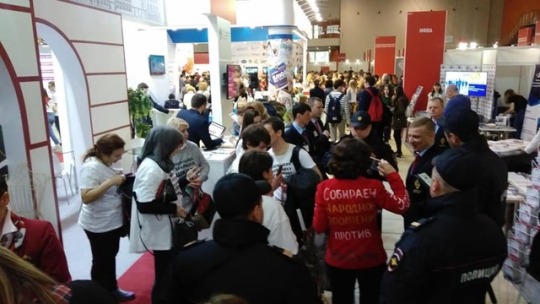


Moscow: Defenders of Lenin Memorial School protest at education forum
April 10: Today, people affected by the closure of the V.I. Lenin Memorial School decided to attend the first day of the “Moscow International Education Salon.”
Recall that the Ministry of Education closed the only school in the village of Gorki Leninskie. As a result, 500 students must receive their education in other schools, which are too far for them to reach independently. Parents are extremely outraged by the fact that their children have to get up very early in order to get to their new schools.
Nine people in clothes inscribed with the words “Return the Gorki School to the children” and [Minister of Education Olga] “Vasilyeva on trial” caused quite a stir in the halls of the international forum. Visitors to the event were interested in learning the reason for the action and expressed their support for the protesters.
9 notes
·
View notes
Photo

Жена Чехова Ольга Книппер (на фото) была первой исполнительницей ролей в его пьесах «Три сестры» и «Вишневый сад», а также играла в пьесе Максима Горького «На дне». Первые ее встречи с Чеховым произошли на репетициях спектаклей МХТ «Чайка» (Аркадина) и «Царь Федор Иоаннович» (царица Ирина). Чехов после этих встреч писал: «Ирина, по-моему, великолепна; голос, благородство, задушевность — так хорошо, что даже в горле чешется. Лучше всех Ирина. Если бы я остался в Москве, то влюбился бы в эту Ирину». О знакомстве с Чеховым она вспоминала впоследствии: «С той встречи начал медленно затягиваться тонкий и сложный узел моей жизни»
Chekhov's wife Olga Knipper (pictured) was the first performer of roles in his plays “Three Sisters” and “The Cherry Orchard”, and also played in Maxim Gorky’s play “At the Bottom”. Her first meetings with Chekhov took place at rehearsals for the performances of the Moscow Art Theater “The Seagull” (Arkadina) and “Tsar Fedor Ioannovich” (Tsarina Irina). Chekhov after these meetings wrote: “Irina, in my opinion, is gorgeous; voice, nobility, sincerity - so good that even it hurts in my throat. Best of all, Irina. If I had stayed in Moscow, I would have fallen in love with this Irina. ” She later recalled her acquaintance with Chekhov: “Since that meeting, the thin and complex knot of my life began to slowly drag on.”
2 notes
·
View notes
Text
Olga Sutulova and Evgeny Stychkin, Nikita Efremov at the screening of the final episode of "Patient Zero"
Olga Sutulova and Evgeny Stychkin, Nikita Efremov at the screening of the final episode of “Patient Zero”
_____________________________ On June 22, Plus Dacha in Gorky Park hosted an open-air screening of the seventh and final series of “Patient Zero” about the first major HIV outbreak in the USSR, which occurred in 1988 in a children’s hospital in Kalmykia. Before the start of the show, there was a discussion of the series with the creators and actors: And the discussion was moderated by senior…
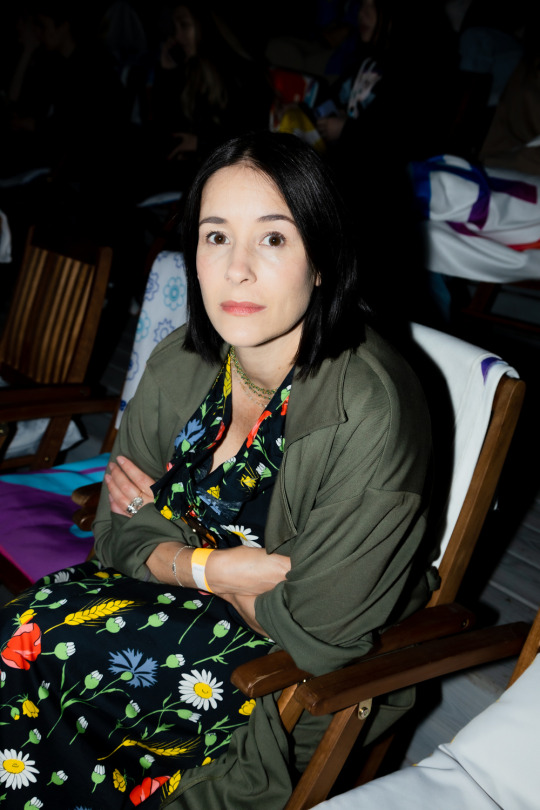
View On WordPress
0 notes
Text
Donne eccellenti a Roma: Olga Resnevic Signorelli

Ci vuol poco a capire l’eccellenza un’ anima come quella della lettone Olga Resnevic (1883-1973), emigrata dalla Russia in Italia che fu medico, giornalista, scrittrice e traduttrice in italiano dei grandi della letteratura del suo paese, amica e sostenitrice di artisti, e curiosamente dimenticata proprio da noi dove il genere femminile è oggi tanto più valorizzato e riconosciuto anche nei casi in cui non se ne sente la necessità. Legata al medico Angelo Signorelli, sensibile collezionista d’arte, Olga Resnevic ebbe tre figlie e la prima di queste fu Maria (1908-1992), straordinaria scenografa e creatrice della famosa Opera dei Burattini (1947) alla cui scuola si formarono tanti autori e registi italiani nel secondo dopoguerra mondiale. Maria Signorelli sicuramente trasse dall’ambiente familiare, e da sua madre, la linfa culturale della sua eccezionale creatività: nella casa romana di Olga in Via XX Settembre passarono personaggi come Gordon Craig, Meierch’old, Aleksander Tairov e Stanislavsky, oltre al grade coreografo Aurel Millos, che l’avviò all’amore per la danza e il balletto moderno. Ma già nei primi anni del ‘900 casa Signorelli era diventata un centro culturale rinomato dove si incontravano i vociani Prezzolini, Soffici, Papini , Arturo Onofri e Giovanni Amendola. A questi si accompagnarono nel tempo gli artisti di cui Angelo Signorelli e Olga furono sostenitori: primi tra questi Armando Spadini, Ferruccio Ferrazzi e Riccardo Francalancia, e poi vennero le amicizie con De Chirico, Savinio e De Pisis. Nel salotto culturale dei Signorelli si svolgevano anche concerti da camera con l’intervento di musicisti di prim’ordine come Alfredo Casella, i violinisti Arrigo Serato e Mario Corti. Nel frattempo Olga Resnevic, dopo avere collaborato col marito ad importanti inziative-pilota di ‘medicina sociale’ (costituì tra l’altro col marito ambulatori per bambini nelle zone povere di Roma), si allontanò dalla professione medica ed iniziò quella di traduttrice, legandosi d’amicizia con Ettore Lo Gatto, per i testi dal russo di Dostoevskji e Vjaceslav Ivanov. Quando nel 1916 giunse a Roma Diaghilev con i ‘Ballets Russes’, Olga entrò in contatto con i futuristi russi Michail Larionov e Natalìa Gonciarova che curavano la scenografia, e si occupò della traduzione dei testi dello spettacolo, indimenticabile esperienza d’avanguardia nella vita artistica romana. Negli anni venti, il collegamento con la vita culturale russa si accrebbe per Olga Resnevic anche dell’amicizia con Massimo Gorky, che frequentò per anni con ripetute visite durante i soggiorni dello scrittore a Sorrento. L’amore per il teatro, la poesia e la letteratura, la portò ad incontrare e stringere amicizia con Sibilla Aleramo, Anton Giulio Bragaglia ed Eleonora Duse di cui scrisse una preziosa biografia nel 1938. Di una così viva personalità, aperta alle migliori esperienze della cultura e dell’arte del ‘900, resta oggi poco o nulla. Di Angelo Signorelli, medico benemerito per la sua filantropia sociale, e di lei, Olga, la russa che animò con le opere, il gusto e la passione la vita dell’arte a Roma, non si fa menzione nemmeno con una strada, o una targa che li ricordi. E’ chiaro che non è giusto. E simili dimenticanze la dicono lunga su chi ci governa e chi amministra la nostra comunità culturale e civile. Nella foto: Armando Spadini, 'Ritratto di Olga Resnevic Signorelli', 1915.
1 note
·
View note
Note
Coffee Ask thingy: Cappuccino, Caramel Frappe, Iced Lemon Tea, Iced Cafe Mocha, Mint Tea, Iced Coffee, Sparkling Water and Herbal Tea~. u v u
Cappuccino : What’s your middle name? I don’t think this is really a thing in Spain? My name is Olga and I have 4 surnames if that helpsCaramel Frappe : Favorite video game?
It probably is either dark souls(Because of Solaire) or metro last light (Because it’s got Pavel in it…) And no I didn’t choose those because they’ve got my favourite characters ahhaha...
Iced Lemon Tea : Favorite song/band?I can’t decide on a song,it changes from time to time :) But my favourite band is Rammstein!Iced Cafe Mocha : Favorite thing to do on rainy days?I’m weird when it comes to that…I’ll either go outside without an umbrella on purpose or stay indoors watching some films, rain is kinda cozy !Mint Tea : How do you relax?Hahaha I don’t think I even can? xD But to be fair…every Saturday when I got training it helpsIced Coffee : Do you like reading? If so, what’s your favorite book?I do! I’ve read a lot,I don’t read as much as I used to though,which is sad… someday I’ll start reading as much as before :)My favourite book is The Mother, by Gorky. Although I also enjoy any ww1 or ww2 books,Sven Hassel ones are nice !Sparkling Water : Describe what qualities you look for in a personI can get along with pretty much everyone but I just like kind,open minded and honest people better I think :)Herbal Tea : You’re at a candle shop, what scented candle do you buy?Already answered! I paste it here;I love candles!! It’d be a difficult choice,everytime I go to a candle shop I end up smelling every single one and feeling sick afterwards :v I’d probably go with something that smells “fresh”? Like mint,pine,lemon…Thanks!!!
2 notes
·
View notes
Photo
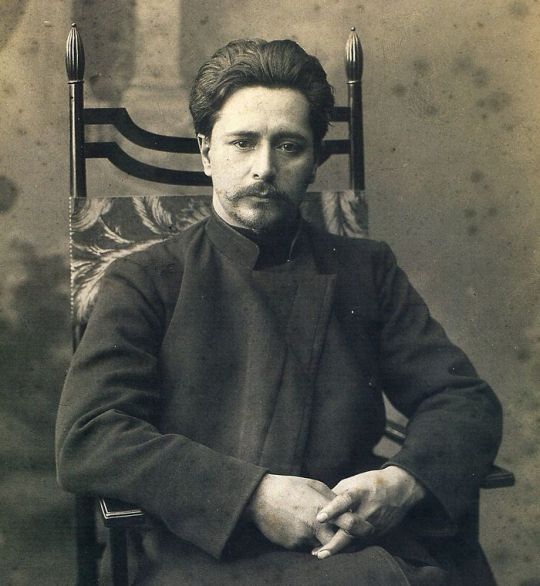
Began her mother, but sobbing, she grew silent
Leonid Andreyev (1871-1919)
Born in 1871 at Orel, Andreyev struggled for many years to earn a livelihood as a lawyer. He began writing in 1900, and was helped and encouraged by Gorky. The note of tragedy and fatalism that characterizes his plays and novels is present also in his numerous short stories, of which Silence is typical.
The present version, translated by John Cournos, was published by Brown Brothers, copyright, 1910. It is reprinted by permission of the present owners, Frank-Maurice, Inc.
Silence
Pane moonlit night in May, while the nightingales sang, Father Ignatius’ wife entered his chamber. Her countenance expressed Itlircring, and the little lamp she held in her hand trembled. Approaching Ixer husband, she touched his shoulder, and managed to say between her sobs: “Father, let us go to Verochka.”
Without turning his head, Father Ignatius glanced severely at his wife over the rims of his spectacles, and looked long and intently, till (he waved her unoccupied hand and dropped on a low divan.
“That one toward the other be so pitiless!” she pronounced slowly, With emphasis on the final syllables, and her good plump face was distorted with a grimace of pain and exasperation, as if in this manner she winked to express what stern people they were her husband and daughter.
Father Ignatius smiled and arose. Closing his book, he removed his nectacles, placed them in the case and meditated. His long, black beard, in woven with silver threads, lay dignified on his breast, and it slowly heaved at every deep breath.
“Well, let us go!” said he.
Olga Stepanovna quickly arose and entreated in an appealing, timid voice:
“Only don’t revile her, father! You know the sort she is.”
Vera’s chamber was in the attic, and the narrow, wooden stair bent and creaked under the heavy tread of Father Ignatius. Tall and ponderous, he lowered his head to avoid striking the floor of the upper story, and frowned disdainfully when the white jacket of his wife brushed his face. Well he knew that nothing would come of their talk with Vera.
“Why do you come?” asked Vera, raising a bared arm to her eyes. The other arm lay on top of a white summer blanket hardly’distinguish- able from the fabric, so white, translucent and cold was its aspect.
“Verochka!” began her mother, but sobbing, she grew silent.
“Vera!” said her father, making an effort to soften his dry and hard voice. “Vera, tell us, what troubles you?”
Vera was silent.
“Vera, do not, we, your mother and I, deserve your confidence? Do we not love you? And is there someone nearer to you than we? Tell us about your sorrow, and believe me you’ll feel better for it. And we too. Look at your aged mother, how much she suffers!”
“Verochka!”
S: https://travel.doturkey.com/silence-part-1/
0 notes
Photo
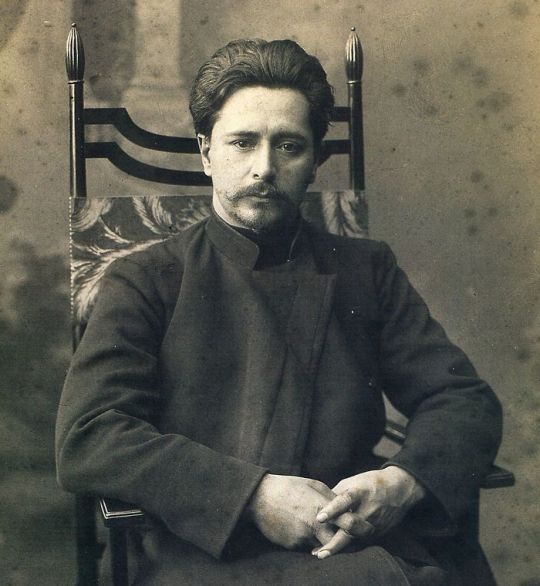
Began her mother, but sobbing, she grew silent
Leonid Andreyev (1871-1919)
Born in 1871 at Orel, Andreyev struggled for many years to earn a livelihood as a lawyer. He began writing in 1900, and was helped and encouraged by Gorky. The note of tragedy and fatalism that characterizes his plays and novels is present also in his numerous short stories, of which Silence is typical.
The present version, translated by John Cournos, was published by Brown Brothers, copyright, 1910. It is reprinted by permission of the present owners, Frank-Maurice, Inc.
Silence
Pane moonlit night in May, while the nightingales sang, Father Ignatius’ wife entered his chamber. Her countenance expressed Itlircring, and the little lamp she held in her hand trembled. Approaching Ixer husband, she touched his shoulder, and managed to say between her sobs: “Father, let us go to Verochka.”
Without turning his head, Father Ignatius glanced severely at his wife over the rims of his spectacles, and looked long and intently, till (he waved her unoccupied hand and dropped on a low divan.
“That one toward the other be so pitiless!” she pronounced slowly, With emphasis on the final syllables, and her good plump face was distorted with a grimace of pain and exasperation, as if in this manner she winked to express what stern people they were her husband and daughter.
Father Ignatius smiled and arose. Closing his book, he removed his nectacles, placed them in the case and meditated. His long, black beard, in woven with silver threads, lay dignified on his breast, and it slowly heaved at every deep breath.
“Well, let us go!” said he.
Olga Stepanovna quickly arose and entreated in an appealing, timid voice:
“Only don’t revile her, father! You know the sort she is.”
Vera’s chamber was in the attic, and the narrow, wooden stair bent and creaked under the heavy tread of Father Ignatius. Tall and ponderous, he lowered his head to avoid striking the floor of the upper story, and frowned disdainfully when the white jacket of his wife brushed his face. Well he knew that nothing would come of their talk with Vera.
“Why do you come?” asked Vera, raising a bared arm to her eyes. The other arm lay on top of a white summer blanket hardly’distinguish- able from the fabric, so white, translucent and cold was its aspect.
“Verochka!” began her mother, but sobbing, she grew silent.
“Vera!” said her father, making an effort to soften his dry and hard voice. “Vera, tell us, what troubles you?”
Vera was silent.
“Vera, do not, we, your mother and I, deserve your confidence? Do we not love you? And is there someone nearer to you than we? Tell us about your sorrow, and believe me you’ll feel better for it. And we too. Look at your aged mother, how much she suffers!”
“Verochka!”
S: https://travel.doturkey.com/silence-part-1/
0 notes
Photo
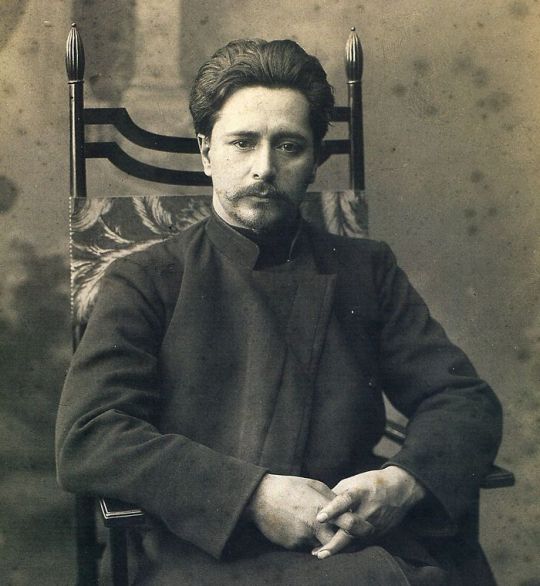
Began her mother, but sobbing, she grew silent
Leonid Andreyev (1871-1919)
Born in 1871 at Orel, Andreyev struggled for many years to earn a livelihood as a lawyer. He began writing in 1900, and was helped and encouraged by Gorky. The note of tragedy and fatalism that characterizes his plays and novels is present also in his numerous short stories, of which Silence is typical.
The present version, translated by John Cournos, was published by Brown Brothers, copyright, 1910. It is reprinted by permission of the present owners, Frank-Maurice, Inc.
Silence
Pane moonlit night in May, while the nightingales sang, Father Ignatius’ wife entered his chamber. Her countenance expressed Itlircring, and the little lamp she held in her hand trembled. Approaching Ixer husband, she touched his shoulder, and managed to say between her sobs: “Father, let us go to Verochka.”
Without turning his head, Father Ignatius glanced severely at his wife over the rims of his spectacles, and looked long and intently, till (he waved her unoccupied hand and dropped on a low divan.
“That one toward the other be so pitiless!” she pronounced slowly, With emphasis on the final syllables, and her good plump face was distorted with a grimace of pain and exasperation, as if in this manner she winked to express what stern people they were her husband and daughter.
Father Ignatius smiled and arose. Closing his book, he removed his nectacles, placed them in the case and meditated. His long, black beard, in woven with silver threads, lay dignified on his breast, and it slowly heaved at every deep breath.
“Well, let us go!” said he.
Olga Stepanovna quickly arose and entreated in an appealing, timid voice:
“Only don’t revile her, father! You know the sort she is.”
Vera’s chamber was in the attic, and the narrow, wooden stair bent and creaked under the heavy tread of Father Ignatius. Tall and ponderous, he lowered his head to avoid striking the floor of the upper story, and frowned disdainfully when the white jacket of his wife brushed his face. Well he knew that nothing would come of their talk with Vera.
“Why do you come?” asked Vera, raising a bared arm to her eyes. The other arm lay on top of a white summer blanket hardly’distinguish- able from the fabric, so white, translucent and cold was its aspect.
“Verochka!” began her mother, but sobbing, she grew silent.
“Vera!” said her father, making an effort to soften his dry and hard voice. “Vera, tell us, what troubles you?”
Vera was silent.
“Vera, do not, we, your mother and I, deserve your confidence? Do we not love you? And is there someone nearer to you than we? Tell us about your sorrow, and believe me you’ll feel better for it. And we too. Look at your aged mother, how much she suffers!”
“Verochka!”
S: https://travel.doturkey.com/silence-part-1/
0 notes
Photo
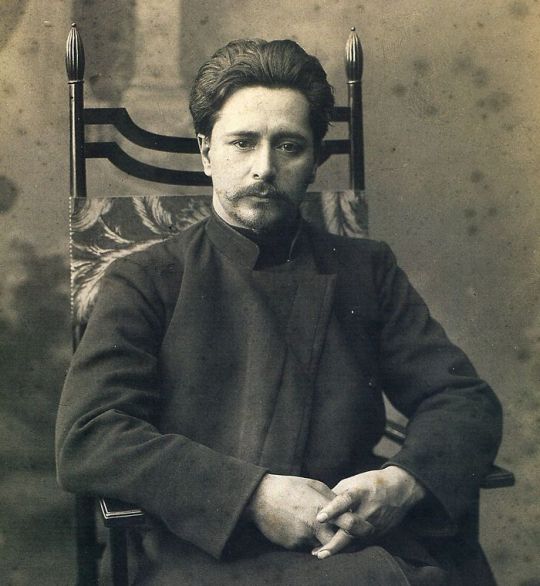
Began her mother, but sobbing, she grew silent
Leonid Andreyev (1871-1919)
Born in 1871 at Orel, Andreyev struggled for many years to earn a livelihood as a lawyer. He began writing in 1900, and was helped and encouraged by Gorky. The note of tragedy and fatalism that characterizes his plays and novels is present also in his numerous short stories, of which Silence is typical.
The present version, translated by John Cournos, was published by Brown Brothers, copyright, 1910. It is reprinted by permission of the present owners, Frank-Maurice, Inc.
Silence
Pane moonlit night in May, while the nightingales sang, Father Ignatius’ wife entered his chamber. Her countenance expressed Itlircring, and the little lamp she held in her hand trembled. Approaching Ixer husband, she touched his shoulder, and managed to say between her sobs: “Father, let us go to Verochka.”
Without turning his head, Father Ignatius glanced severely at his wife over the rims of his spectacles, and looked long and intently, till (he waved her unoccupied hand and dropped on a low divan.
“That one toward the other be so pitiless!” she pronounced slowly, With emphasis on the final syllables, and her good plump face was distorted with a grimace of pain and exasperation, as if in this manner she winked to express what stern people they were her husband and daughter.
Father Ignatius smiled and arose. Closing his book, he removed his nectacles, placed them in the case and meditated. His long, black beard, in woven with silver threads, lay dignified on his breast, and it slowly heaved at every deep breath.
“Well, let us go!” said he.
Olga Stepanovna quickly arose and entreated in an appealing, timid voice:
“Only don’t revile her, father! You know the sort she is.”
Vera’s chamber was in the attic, and the narrow, wooden stair bent and creaked under the heavy tread of Father Ignatius. Tall and ponderous, he lowered his head to avoid striking the floor of the upper story, and frowned disdainfully when the white jacket of his wife brushed his face. Well he knew that nothing would come of their talk with Vera.
“Why do you come?” asked Vera, raising a bared arm to her eyes. The other arm lay on top of a white summer blanket hardly’distinguish- able from the fabric, so white, translucent and cold was its aspect.
“Verochka!” began her mother, but sobbing, she grew silent.
“Vera!” said her father, making an effort to soften his dry and hard voice. “Vera, tell us, what troubles you?”
Vera was silent.
“Vera, do not, we, your mother and I, deserve your confidence? Do we not love you? And is there someone nearer to you than we? Tell us about your sorrow, and believe me you’ll feel better for it. And we too. Look at your aged mother, how much she suffers!”
“Verochka!”
S: https://travel.doturkey.com/silence-part-1/
0 notes
Photo
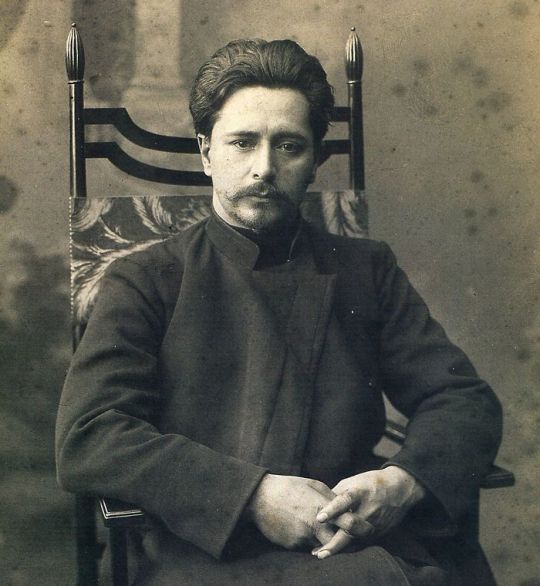
Verochka!
Leonid Andreyev (1871-1919)
Born in 1871 at Orel, Andreyev struggled for many years to earn a livelihood as a lawyer. He began writing in 1900, and was helped and encouraged by Gorky. The note of tragedy and fatalism that characterizes his plays and novels is present also in his numerous short stories, of which Silence is typical.
The present version, translated by John Cournos, was published by Brown Brothers, copyright, 1910. It is reprinted by permission of the present owners, Frank-Maurice, Inc.
Silence
Pane moonlit night in May, while the nightingales sang, Father Ignatius’ wife entered his chamber. Her countenance expressed Itlircring, and the little lamp she held in her hand trembled. Approaching Ixer husband, she touched his shoulder, and managed to say between her sobs: “Father, let us go to Verochka.”
Without turning his head, Father Ignatius glanced severely at his wife over the rims of his spectacles, and looked long and intently, till (he waved her unoccupied hand and dropped on a low divan.
“That one toward the other be so pitiless!” she pronounced slowly, With emphasis on the final syllables, and her good plump face was distorted with a grimace of pain and exasperation, as if in this manner she winked to express what stern people they were her husband and daughter.
Father Ignatius smiled and arose. Closing his book, he removed his nectacles, placed them in the case and meditated. His long, black beard, in woven with silver threads, lay dignified on his breast, and it slowly heaved at every deep breath.
“Well, let us go!” said he.
Olga Stepanovna quickly arose and entreated in an appealing, timid voice:
“Only don’t revile her, father! You know the sort she is.”
Vera’s chamber was in the attic, and the narrow, wooden stair bent and creaked under the heavy tread of Father Ignatius. Tall and ponderous, he lowered his head to avoid striking the floor of the upper story, and frowned disdainfully when the white jacket of his wife brushed his face. Well he knew that nothing would come of their talk with Vera.
“Why do you come?” asked Vera, raising a bared arm to her eyes. The other arm lay on top of a white summer blanket hardly’distinguish- able from the fabric, so white, translucent and cold was its aspect.
“Verochka!” began her mother, but sobbing, she grew silent.
“Vera!” said her father, making an effort to soften his dry and hard voice. “Vera, tell us, what troubles you?”
Vera was silent.
“Vera, do not, we, your mother and I, deserve your confidence? Do we not love you? And is there someone nearer to you than we? Tell us about your sorrow, and believe me you’ll feel better for it. And we too. Look at your aged mother, how much she suffers!”
Source: https://universal.doholidays.com/silence-part-1/
0 notes
Photo

Verochka!
Leonid Andreyev (1871-1919)
Born in 1871 at Orel, Andreyev struggled for many years to earn a livelihood as a lawyer. He began writing in 1900, and was helped and encouraged by Gorky. The note of tragedy and fatalism that characterizes his plays and novels is present also in his numerous short stories, of which Silence is typical.
The present version, translated by John Cournos, was published by Brown Brothers, copyright, 1910. It is reprinted by permission of the present owners, Frank-Maurice, Inc.
Silence
Pane moonlit night in May, while the nightingales sang, Father Ignatius’ wife entered his chamber. Her countenance expressed Itlircring, and the little lamp she held in her hand trembled. Approaching Ixer husband, she touched his shoulder, and managed to say between her sobs: “Father, let us go to Verochka.”
Without turning his head, Father Ignatius glanced severely at his wife over the rims of his spectacles, and looked long and intently, till (he waved her unoccupied hand and dropped on a low divan.
“That one toward the other be so pitiless!” she pronounced slowly, With emphasis on the final syllables, and her good plump face was distorted with a grimace of pain and exasperation, as if in this manner she winked to express what stern people they were her husband and daughter.
Father Ignatius smiled and arose. Closing his book, he removed his nectacles, placed them in the case and meditated. His long, black beard, in woven with silver threads, lay dignified on his breast, and it slowly heaved at every deep breath.
“Well, let us go!” said he.
Olga Stepanovna quickly arose and entreated in an appealing, timid voice:
“Only don’t revile her, father! You know the sort she is.”
Vera’s chamber was in the attic, and the narrow, wooden stair bent and creaked under the heavy tread of Father Ignatius. Tall and ponderous, he lowered his head to avoid striking the floor of the upper story, and frowned disdainfully when the white jacket of his wife brushed his face. Well he knew that nothing would come of their talk with Vera.
“Why do you come?” asked Vera, raising a bared arm to her eyes. The other arm lay on top of a white summer blanket hardly’distinguish- able from the fabric, so white, translucent and cold was its aspect.
“Verochka!” began her mother, but sobbing, she grew silent.
“Vera!” said her father, making an effort to soften his dry and hard voice. “Vera, tell us, what troubles you?”
Vera was silent.
“Vera, do not, we, your mother and I, deserve your confidence? Do we not love you? And is there someone nearer to you than we? Tell us about your sorrow, and believe me you’ll feel better for it. And we too. Look at your aged mother, how much she suffers!”
Source: https://universal.doholidays.com/silence-part-1/
0 notes
Photo
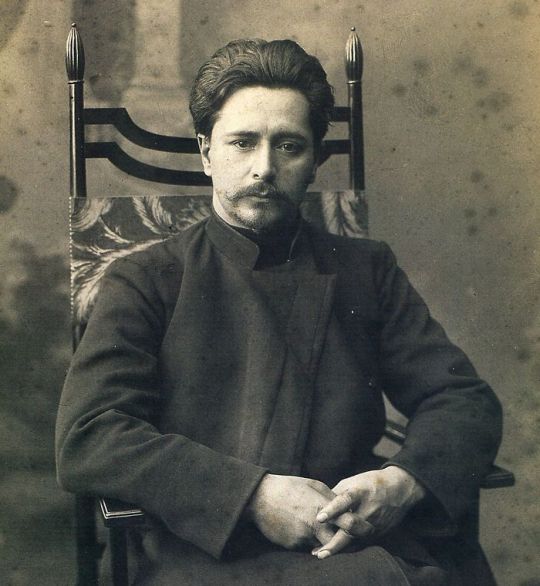
Verochka!
Leonid Andreyev (1871-1919)
Born in 1871 at Orel, Andreyev struggled for many years to earn a livelihood as a lawyer. He began writing in 1900, and was helped and encouraged by Gorky. The note of tragedy and fatalism that characterizes his plays and novels is present also in his numerous short stories, of which Silence is typical.
The present version, translated by John Cournos, was published by Brown Brothers, copyright, 1910. It is reprinted by permission of the present owners, Frank-Maurice, Inc.
Silence
Pane moonlit night in May, while the nightingales sang, Father Ignatius’ wife entered his chamber. Her countenance expressed Itlircring, and the little lamp she held in her hand trembled. Approaching Ixer husband, she touched his shoulder, and managed to say between her sobs: “Father, let us go to Verochka.”
Without turning his head, Father Ignatius glanced severely at his wife over the rims of his spectacles, and looked long and intently, till (he waved her unoccupied hand and dropped on a low divan.
“That one toward the other be so pitiless!” she pronounced slowly, With emphasis on the final syllables, and her good plump face was distorted with a grimace of pain and exasperation, as if in this manner she winked to express what stern people they were her husband and daughter.
Father Ignatius smiled and arose. Closing his book, he removed his nectacles, placed them in the case and meditated. His long, black beard, in woven with silver threads, lay dignified on his breast, and it slowly heaved at every deep breath.
“Well, let us go!” said he.
Olga Stepanovna quickly arose and entreated in an appealing, timid voice:
“Only don’t revile her, father! You know the sort she is.”
Vera’s chamber was in the attic, and the narrow, wooden stair bent and creaked under the heavy tread of Father Ignatius. Tall and ponderous, he lowered his head to avoid striking the floor of the upper story, and frowned disdainfully when the white jacket of his wife brushed his face. Well he knew that nothing would come of their talk with Vera.
“Why do you come?” asked Vera, raising a bared arm to her eyes. The other arm lay on top of a white summer blanket hardly’distinguish- able from the fabric, so white, translucent and cold was its aspect.
“Verochka!” began her mother, but sobbing, she grew silent.
“Vera!” said her father, making an effort to soften his dry and hard voice. “Vera, tell us, what troubles you?”
Vera was silent.
“Vera, do not, we, your mother and I, deserve your confidence? Do we not love you? And is there someone nearer to you than we? Tell us about your sorrow, and believe me you’ll feel better for it. And we too. Look at your aged mother, how much she suffers!”
Source: https://universal.doholidays.com/silence-part-1/
0 notes